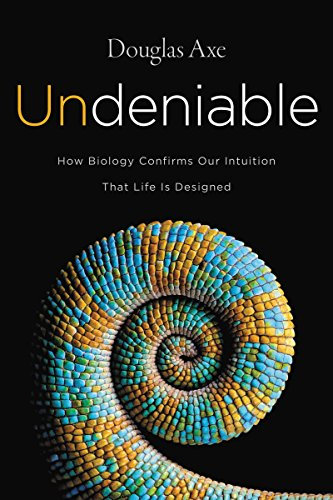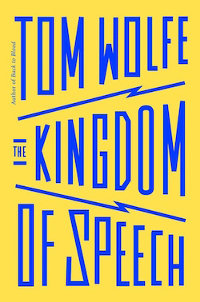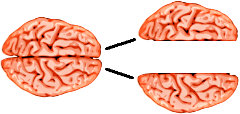 Douglas Axe is a highly trained molecular biologist (Cal Tech PhD, post-doc and research positions at Cambridge). He wrote a great article at The Stream about how facts get in the way of the (macro) evolutionary model as it is now taught in the vast majority of our academic institutions around the world. This has been known for decades and Axe calls out the evolutionary story tellers.
Douglas Axe is a highly trained molecular biologist (Cal Tech PhD, post-doc and research positions at Cambridge). He wrote a great article at The Stream about how facts get in the way of the (macro) evolutionary model as it is now taught in the vast majority of our academic institutions around the world. This has been known for decades and Axe calls out the evolutionary story tellers.
Here’s the steel-hard fact they most want to avoid:
The evolutionary explanation of life cannot stand up to NASA-style engineering scrutiny.
If you doubt this, please join me in testing it. Hand pick your Darwin sympathizers from the most esteemed places. It doesn’t matter who they are, because all the pomp and prestige of the academic world is powerless to change hard facts. All claims of Darwin having discovered the only scientifically valid explanation of life get torn to tiny bits when you put them in the grinder.
The response to this challenge is sure to be either silence or protest. There won’t be a nerdy evolutionary biologist who marches up to the chalk board and does the math that saves the theory. The math has been done; the theory undone. Nor will there be a lab test that shows natural selection to be a worker of wonders. We’ve been there. Too many tests to count, and the blind watchmaker never showed up.
It has gotten so bad and the fact that the emperor has no clothes is so obvious, Tom Wolfe, author of The Right Stuff and The Bonfire of the Vanities has written about it in his most recent book, The Kingdom of Speech. I wrote about that earlier (here). Wolfe seems to specialize in calling attention to false and/or base and repugnant ideas and people who are held in high regard by the so-called elites in our society. He does this masterfully one more time with the pompous Noam Chomsky and his take on linguistics as well as the false Darwinian zeitgeist of our day.
Douglas Axe has written a popular level book titled Undeniable: How Biology Confirms Our Intuition That Life is Design on the subject, too. In addition, he takes on the idea that “regular people” just are not smart enough to understand why (macro) evolution did not happen. Axe’s article in The Stream, his book and Wolfe’s books are all great reads.
 Wilder Penfield’s conversion from ardent “strident materialist” to “passionate dualist” was a result of the scientific brain research he performed in his work as a neurosurgeon. Michael Egnor explains it all here. Egnor further notes that there is an even more compelling case for dualism based on a philosophical and logic arguments that dovetail nicely with the scientific ones. The article is well worth the read. He makes this statement at the end of the article.
Wilder Penfield’s conversion from ardent “strident materialist” to “passionate dualist” was a result of the scientific brain research he performed in his work as a neurosurgeon. Michael Egnor explains it all here. Egnor further notes that there is an even more compelling case for dualism based on a philosophical and logic arguments that dovetail nicely with the scientific ones. The article is well worth the read. He makes this statement at the end of the article.

 A very cool new toy arrived at our door a couple of days ago. It is a camera copy stand that will hold a cellphone or other arbitrary item that fits a certain form factor. It will be invaluable in the bean sorting project, but I will be able to use it for a lot of other machine vision image capture testing tasks. We have made a lot of progress on the project and expect to start buying the actual cameras and lighting we hope to use within the next few weeks. The next difficult task is to drop the beans past a camera while we synchronize the capture and lighting of the scene so the bean is not blurry and we can see the surface of both sides very well. There are more tricky little things we need to do after that, but we cannot move forward until we know that is possible. As soon as that is figured out, I will see if Gene can help me set up a more permanent test fixture to systematically drop beans past the cameras so we can gather a test set from which to build a classifier.
A very cool new toy arrived at our door a couple of days ago. It is a camera copy stand that will hold a cellphone or other arbitrary item that fits a certain form factor. It will be invaluable in the bean sorting project, but I will be able to use it for a lot of other machine vision image capture testing tasks. We have made a lot of progress on the project and expect to start buying the actual cameras and lighting we hope to use within the next few weeks. The next difficult task is to drop the beans past a camera while we synchronize the capture and lighting of the scene so the bean is not blurry and we can see the surface of both sides very well. There are more tricky little things we need to do after that, but we cannot move forward until we know that is possible. As soon as that is figured out, I will see if Gene can help me set up a more permanent test fixture to systematically drop beans past the cameras so we can gather a test set from which to build a classifier.

 Kiwi was very nervous on all of the drive from Texas to Tempe except when we were in the hotel room. For some reason, neatly made beds are calming to her. When we got to Christian’s apartment, though, she was in heaven–just happy and excited to be there. Lorena has been doing her usual workout, shop and clean routine while Christian and I have kept our noses to the grindstone, him on homework and exams needed to finish the semester and me on software improvements for the sickle cell disease project which is scheduled for clinical testing in Nigeria and who knows where else over the next several months. The first testing will take place in Nigeria and I have one VERY big set of functionality to add before I go to a big church convention tomorrow. I would rather join Kiwi which maybe is why I don’t make the big bucks.
Kiwi was very nervous on all of the drive from Texas to Tempe except when we were in the hotel room. For some reason, neatly made beds are calming to her. When we got to Christian’s apartment, though, she was in heaven–just happy and excited to be there. Lorena has been doing her usual workout, shop and clean routine while Christian and I have kept our noses to the grindstone, him on homework and exams needed to finish the semester and me on software improvements for the sickle cell disease project which is scheduled for clinical testing in Nigeria and who knows where else over the next several months. The first testing will take place in Nigeria and I have one VERY big set of functionality to add before I go to a big church convention tomorrow. I would rather join Kiwi which maybe is why I don’t make the big bucks. We saw the April 30, 2017 whiteboard (below) when we first arrived at his apartment on our move to Centralia, WA. Christian hopes he is on the verge of his first (semi) important, first author publication in a major academic journal. The work for that paper is pretty much done. He has to refine the verbiage and get past the whole scholarly review thing which is never a sure thing, but he has something that is pretty solid. The two whiteboard’s below are two consecutive days of work. I thought he spent a lot of time at the computer, but that is not really how he works. He looks at the whiteboard and then he just thinks. His job, his professor tells him, is to think. He has a second paper in mind. He hopes it will be better than the first. The first is solid–something that needed to be worked out. The second, however, is something that might be a true innovation. Something new, not yet considered, that contributes to the field. We hope so, but it is hard to know. Even after a paper like that is published, its importance might not even be know in the lifetime of the author. Truly interesting stuff. AND the whiteboards look really cool.
We saw the April 30, 2017 whiteboard (below) when we first arrived at his apartment on our move to Centralia, WA. Christian hopes he is on the verge of his first (semi) important, first author publication in a major academic journal. The work for that paper is pretty much done. He has to refine the verbiage and get past the whole scholarly review thing which is never a sure thing, but he has something that is pretty solid. The two whiteboard’s below are two consecutive days of work. I thought he spent a lot of time at the computer, but that is not really how he works. He looks at the whiteboard and then he just thinks. His job, his professor tells him, is to think. He has a second paper in mind. He hopes it will be better than the first. The first is solid–something that needed to be worked out. The second, however, is something that might be a true innovation. Something new, not yet considered, that contributes to the field. We hope so, but it is hard to know. Even after a paper like that is published, its importance might not even be know in the lifetime of the author. Truly interesting stuff. AND the whiteboards look really cool.

 I have written about the
I have written about the 



 Michael Egnor has been on my radar for several years now. I love the way he writes and most of what he says (latest example
Michael Egnor has been on my radar for several years now. I love the way he writes and most of what he says (latest example 